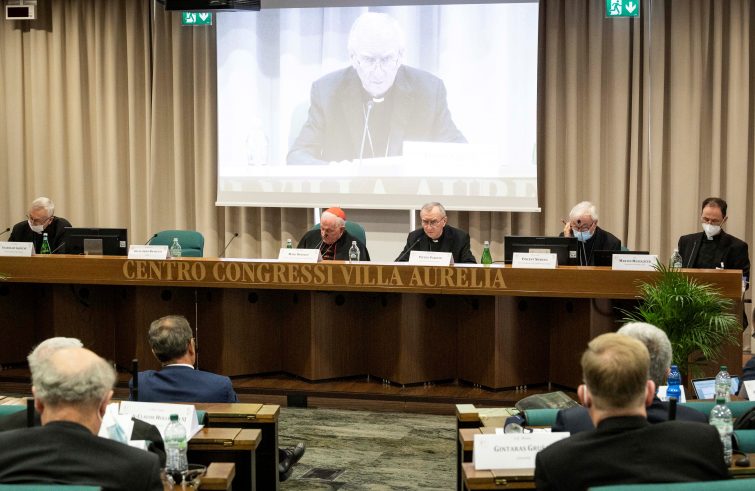
The Church in Europe addresses the continent’s major issues and challenges. Migration and the question of reception. The family and the culture of death, the climate change crisis and care for the environment, the wounds of peace and rejection of war as a conflict resolution strategy. The plenary assembly of the CCEE, the Council of the European Bishops’ Conferences established by Pope Paul VI, which celebrates its fiftieth anniversary this year, is in full swing in Rome, with debates addressing a wide range of issues. The presidents of all the Bishops’ Conferences of Europe were received by Pope Francis and by the President of the Italian Republic, Sergio Mattarella, at the Quirinale Palace. The meeting, as encompassed in its theme, “CCEE, 50 years serving Europe, memory and perspectives in the context of Fratelli tutti“, is above all an opportunity for reflection and sharing. Cardinal Angelo Bagnasco who served as CCEE President for five years, recently tested positive for COVID-19 and could not attend the event. He sent a message that was read out at the Plenary: “As shepherds, we look at Europe with affection and concern. Our wish is for Europe to continue walking together from the Atlantic to the Urals. The continent is one body, it was born as one, and, especially thanks to the Christian presence, it has continued to breathe in the pure air of the Gospel in the fruitful encounter between faith and reason: without this virtuous relationship everything grows difficult, even sincere dialogue is left without its essential tools.” “Europe is a varied and complex continent – said Cardinal Péter Erdő in his address – that comprises secularised countries that are witnessing the “tensions and the concerns of a burning Church”, former communist countries and regions with an Orthodox majority, as well as countries, such as Turkey, with an Islamic majority. “A half century of experience has taught us that the lofty mission of the Council of the Bishops’ Conferences of this continent consists not in building a continental ‘curia’ to govern according to the same detailed and practical criteria all the particular Churches. In fact its mission is to form a forum of fraternal Christian love”, to “share experiences, study phenomena of vital importance” and be sensitive to the joys and sufferings “of our brethren and try to help according to our possibilities.”
In his address, Cardinal Gualtiero Bassetti, president of the Italian Bishops’ Conference, called for a “solidarity-based” Europe, open to dialogue and capable of “building a world of peace together.” “I dream of a new Europe marked by solidarity that can truly be a common home – and not just a set of structures”, His Eminence said. “One that is rooted in a new European humanism and founded on the centrality of the human person – the dignity of whom is inalienable – and on a new culture of ‘dialogue’ and ‘social friendship’, as Francis writes in Fratelli tutti“. In his speech, Card. Bassetti referred to the “extremely delicate” issue of migration. He said: “Coordinated action is needed at an international level to effectively tackle a phenomenon that is both complex and dramatic. On this point, Europe’s role is fundamental.”
“How many men, women and children are forced to flee their countries to seek refuge elsewhere. How can we forget the image of the Afghan mother who entrusted her child from her hands to those of someone who could ensure him a brighter future? And yet, even in the face of such undignified situations, we often observe forms of indifference that pains us.”
Culture of life, care for the environment, peace building. Those were the themes mentioned by Card. Pietro Parolin, Vatican Secretary of State, in his long speech to the Assembly. “It is of utmost importance that the Churches in Europe support each other in proclaiming the Gospel of life against the many, too many, declarations of death that resound throughout the Continent.” The Secretary of State referred to the “throwaway culture” frequently mentioned by Pope Francis. His Eminence remarked: “Europe is experiencing unprecedented opulence and is therefore susceptible to the temptation to discard what appears to be superfluous. Unfortunately, these ‘superfluous commodities’ often include human beings. Thus it is of the utmost urgency that the Churches support each other also in their pastoral care for the defence of life”, lest a certain ‘culture of death’ be allowed to predominate the legislative landscape of Europe.” On the day marking “Friday for Future”, when young people in Rome and all over the world take to the streets, Card. Parolin dedicated a part of his speech to the theme of environmental protection, calling for “concrete actions.”
“The care of creation is yet another challenge that, along with the COVID-19 pandemic, constitutes one of the most urgent challenges facing humanity today”.
“Nor should the ongoing health crisis dampen our commitment for the care of our common home. In fact it can help us broaden our reflections and, above all, encourage us to implement practical measures.” Cardinal Parolin made a strong statement on Europe’s responsibility in building a world of peace. “The Holy See”, he said, “holds peace at heart in all its dimensions and consistently emphasises the need to ensure it by radically rejecting war as a means of settling conflicts between States, and through de facto disarmament.” Only a spirit of trust, dialogue and solidarity will foster true peace, as “the offering of forgiveness and reconciliation, of friendship and fraternity, of truth and love.” Peace must become “an art that involves and concerns everyone, with the contribution of each person in a never-ending commitment”, concluded the Secretary of State.









